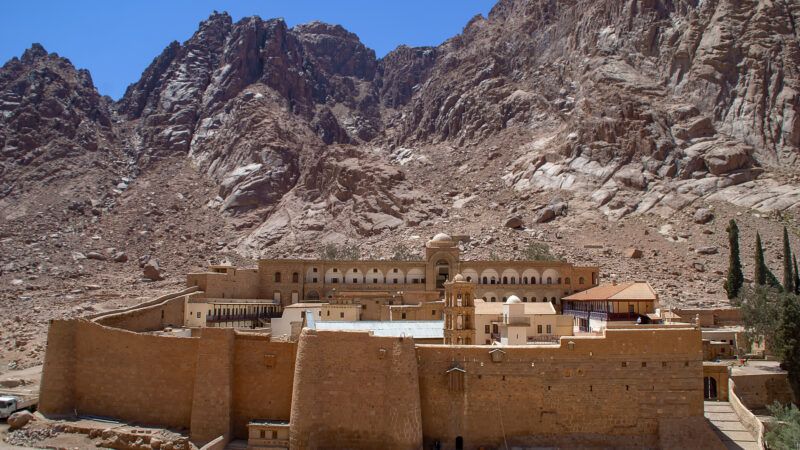Egypt's Land Grab Threatens the World's Oldest Christian Monastery
St. Catherine’s Monastery has been continuously inhabited for over 1,500 years. An Egyptian court ruling ended the monastery's longstanding separation from the government.

In the sixth century, Christian monks built St. Catherine's Monastery in Egypt's Sinai Peninsula. The monastery is believed to be located at the very place where God appeared to Moses via a burning bush. Valuable Christian relics are stored at St. Catherine's, among them parts of the Codex Sinaiticus, which contains the oldest complete copy of the New Testament.
Since its inception, the monastery has never been destroyed, but recent efforts by the Egyptian government could effectively end St. Catherine's independence and inhibit the religious freedom of its monks.
In May, a legal ruling by an Egyptian appeals court "affirmed government ownership of land beneath the centuries-old Saint Catherine's Monastery in Sinai," although the government stressed that it would not interfere with the monastery's long-standing autonomy, reports Egyptian Streets. Despite these assurances, the monks of St. Catherine's protested against the ruling and closed the site to all visitors on June 6.
Ownership of St. Catherine's has been a contentious issue for some time. Beginning in 1980, the government "asked property owners whose land was not already listed in an official registry to file declarations of ownership," writes The Pillar. St. Catherine's did so, filing over 70 different declarations to cover its gardens, chapels, and parcels of land. Then, in 2015, authorities in Egypt's South Sinai Governorate went to the courts to "assert state ownership over the monastery's plots of land." Concerned by the legal dispute, the monks "entered into discussions with the South Sinai authorities and also the Greek government, which takes a strong interest in the institution" as St. Catherine's is part of the Greek Orthodox Church.
A draft agreement acknowledged the monastery and its land as belonging to the Greek Orthodox Church. After the text was agreed upon, an Egyptian court altered the agreement, declaring the monastery state property, while recognizing the monks' right to perform their religious duties at the site. The 160-page text was reportedly so complex that "even legal professionals struggled to grasp it fully."
Egypt's State Information Service issued a statement, claiming the ruling is merely regulating the monastery's legal status, while affirming the land as sacred. However, Egypt's constitution recognizes Islam as the state religion, which could be problematic now that Egypt holds state control over the Christian site.
In fact, it already has. St. Catherine's has a manuscript collection that rivals the Vatican, and for decades, its monks would oversee the efforts of outside researchers of these documents. In 2023, the Egyptian government seized control of the monastery's research efforts. "Since the government takeover, the new state-run system has yet to approve a single research request," writes Mariam Wahba in The Free Press.
Wahba, who was raised in Egypt's Coptic Christian community, describes the government's gradual chipping of St. Catherine's autonomy as "a microcosm of Egypt's broader campaign against the country's estimated 10 to 15 million Christians in the majority Sunni Muslim nation." The country has laws against blasphemy and discriminatory requirements for building and repairing churches, with religious persecution not uncommon for those with views the state deems as unorthodox.
"The state does not need to evict monks or fully ban prayer to undermine Christians' religious freedom. By nationalizing the site and cutting it off from the global research and religious communities that have long sustained it, the government is effectively severing the monastery from its identity and function," writes Wahba.
Egypt is also planning a development project near the monastery, called "The Great Transfiguration," described as a megacity for spiritual tourism. In a post shared on X, the government announced the national project, saying it highlights "the unique tourism, archaeological, environmental, and spiritual components of Sinai," a decision which may be responsible for the recent land grab.
Despite these troubling trends, Egypt maintains that St. Catherine's is safe. Earlier this month, Greek Foreign Minister George Gerapetritis held a meeting with his Egyptian counterpart Badr Abdelatty. After the meeting, Gerapetritis "said he received assurances that the continuity and Greek Orthodox character of the Holy Monastery of St Catherine on Mount Sinai would not be disrupted," writes Greek Reporter.
However, with the government's track record of violating religious freedom, its ownership of the monastery means that the future of St. Catherine's is now in jeopardy.
